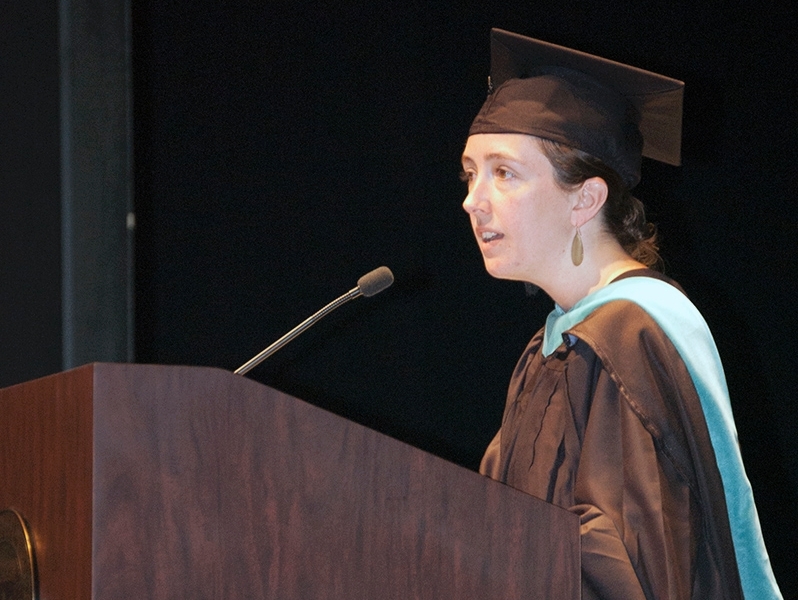
Good morning and congratulations to my fellow graduates. I am honored to have the opportunity to speak before you today.
As many of you know, I received my undergraduate degree from Brandeis many years ago. Both my acceptance to Brandeis and my subsequent graduation felt like an achievement, a testament to my hard work and ability. I was proud of myself.
But today is different. Having the opportunity to study at Heller for two years has felt less like an achievement and more like a blessing. During that first week of orientation I found myself thinking “these are my people, I am exactly where I belong.” Early in the first semester I remarked, in all of my nerdiness, what a luxury it was to be able to take time out from life and immerse ourselves in the founding documents of our country. And hardly a day goes by that I am not grateful for the rare privilege of being surrounded by people whose sole professional aim is to make the world a better place. Moved by your commitment to elevating the voices of the unheard, inspired by your willingness to engage in controversy in the pursuit of social justice, today I find myself filled not with pride but with humility.
Over the course of these two years, I have had opportunities to put the lessons and ideologies of Heller to the test in the quote “real worlds” unquote of professional research and local politics. While campaigning for a seat on the Waltham School Committee, I mentioned the well-documented correlation between poverty and low educational attainment. I was quickly and hostilely rebuffed, and was given many examples of individuals who have succeeded despite humble beginnings. Now, as a member of that committee, I have been working to promote a local dual language program for Waltham schools that would develop Spanish/English bilingualism. While the reactions have been mostly positive, I have also been met with some skepticism and some anger. “If they get to keep their Spanish, what incentive do they have to learn English?” “Why should my tax money go toward helping kids learn Spanish? This is America. They should speak English.” In my job as an educational research consultant, I have been evaluating school transformation efforts in Tennessee. While interviewing some teachers there, I was asked “But do you really think all students are, you know, college material?”
These interactions have been a sober reminder that the concepts we sometimes take for granted here are not always widely understood or agreed upon beyond the Heller walls. At first, I found this frustrating. I struggled to find ways to communicate my ideas without launching into tedious and pedantic recountings of U.S. history. I found myself questioning the value of my education and searching for ways to make it useful. I wondered whether I could share my knowledge and sense of urgency without alienating myself from my local community.
After much practice and reflection, I still struggle with these conversations. But I have gotten a little better. I’ve realized that it’s not about wielding knowledge, but about seeking a shared understanding. It requires deep respect for others, and an active pursuit of authentic dialogue. It’s about having the courage to become more fully human ourselves, and having the grace to recognize that humanity in others. The true gift of our Heller education is not that we have acquired the knowledge to advance social justice, but that we have begun to develop the skills necessary for this difficult work. I am honored to have begun this work with all of you, and I hope that we will continue to look to each other as a source of strength and inspiration. So go enjoy some much needed, well deserved down time. And then - let’s get to work!
